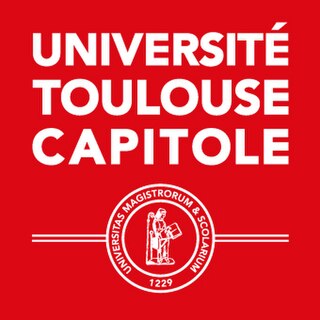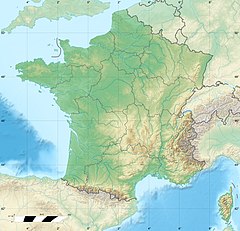
The University of Toulouse is a community of universities and establishments (ComUE) based in Toulouse, France. Originally it was established in 1229, making it one of the earliest universities to emerge in Europe. Suppressed during the French Revolution in 1793, it was refounded in 1896 as part of the reorganization of higher education. It was finally abolished in 1969, giving birth to the three current universities: Toulouse 1 Capitole University, University of Toulouse-Jean Jaurès and Toulouse III - Paul Sabatier University. The ComUE in the Toulouse region was known as Federal University of Toulouse Midi-Pyrénées. On January 1, 2023, the university was renamed as the University of Toulouse.
The Institut National des Sciences Appliquées de Toulouse is a French grande école of engineering, under the authority of the French Ministry of Education and Research. Situated in Toulouse, this school is one of the 6 state engineering institutes that compose the INSA's network.
Sciences Po Toulouse, or the Institut d'études politiques de Toulouse is one of the nine Institutes of Political Studies of France. Based in the center of Toulouse, France, next to the Université Toulouse 1 Capitole, this highly selective political science grande école was founded by a Decree in 1948 under the name of Institut d'études politiques de l'université de Toulouse. Since 2004 the courses have been 5 years long.

Toulouse Capitole University is a public university in Toulouse, France. It is one of the three universities of the city of Toulouse, in southwestern France. The university, presided by Hugues Kenfack, focuses on social sciences, law, political science, economics and administration. An active member of the federal University of Toulouse, it became an experimental public institution on January 1, 2023.

TBS Education, formerly Toulouse Business School and Groupe ESC Toulouse, is a triple crown business school founded in 1903 by the Toulouse Chamber of Commerce and Industry. This highly selective grande école offers several types of training ranging from Bachelors and Masters in the field of management, including the most prestigious of them called the "Grande Ecole" Program (PGE), and a joint DBA with the University of Toulouse, Toulouse School of Management. It holds triple accreditation-EQUIS, AACSB and AMBA-and is a member of both the Federal University of Toulouse Midi-Pyrénées and the Conférence des grandes écoles (CGE). It offers business courses in English, French, and Spanish to over 7,000 students, many international, trained each year in its initial and continuing training programmes, and has business schools located in Toulouse, Paris, Barcelona, and Casablanca. Research is focused on emerging sectors; the school has developed two clusters: the first dedicated to Artificial Intelligence and data analysis, the second to aerospace mobility.
The National University Institute Jean-Francois Champollion, formerly known as Jean-Francois Champollion University Center for Teaching and Research is a French university, in the Academy of Toulouse. Founded in 2002 on the site of the former military barracks of the Caserne Lapérouse in Albi, France, site of its main campus and administrative offices, it also has campuses in Rodez and Castres. With fewer than 4000 students it is one of France's smallest universities, a fact which has often been credited with its high rate of student success. In 2014 and again in 2017, it was ranked first among all French universities for first-year students successfully passing on the second year of licence.

Paul Sabatier University is a French university, in the Academy of Toulouse. It is one of the several successor universities of the University of Toulouse.
French university associations known as "pôles de recherche et d'enseignement supérieur" were a form of higher-level organization for universities and other institutions established by French law in effect from 2007 to 2013. The 2013 Law on Higher Education and Research (France) discontinued the PRES; these have been largely replaced by the new Communities of Universities and Institutions. The list below indicates the status of those institutions designated as PRES or related associations before the 2013 law took effect. See the list of public universities in France for the current status of these institutions.
The Institut de Recherche en Astrophysique et Planétologie (IRAP), formerly the Centre d'Etude Spatiale des Rayonnements (CESR), is a French laboratory of space astrophysics. It is located in Toulouse. The center's main areas of investigation are: space plasmas, planetology, the high energy universe, and the cold universe.

Toulouse School of Economics is a school of economics, affiliated with Toulouse 1 Capitole University, a constituent college of the Federal University of Toulouse Midi-Pyrénées. It is located in the city of Toulouse, France.

École nationale vétérinaire de Toulouse, is a veterinary school located in Toulouse, France. Established in 1825, it is also an institution of higher education and research and a teaching hospital.
Federal University of Toulouse Midi-Pyrénées is the association of universities and higher education institutions (ComUE) for institutions of higher education and research in the French region of Midi-Pyrénées. On 1 January 2023 it was renamed as the University of Toulouse.

The Institute of Pharmacology and Structural Biology is a research center run as a collaboration between the French National Centre for Scientific Research and Paul Sabatier University. It has a scientific and administrative staff of 260 people, including a large number of postdoctoral workers and postgraduate students. The primary objective of the institute is the identification and characterization of novel therapeutic targets in the fields of cancer and infectious diseases.

Toulouse School of Management is a public management school, part of Toulouse 1 University Capitole in France. It is also a component of the IAE's network, bringing together 35 national management schools around France.
COUPERIN is an academic consortium in France. Formed in 1999, it includes more than 250 universities, research organizations, Grandes écoles (schools), COMUE, and others. The consortium negotiates with publishers the prices and conditions of access to scientific publications and other digital resources for the benefit of its members. It promotes open science, particularly with regard to scientific publications, both nationally and internationally. It is headquartered in Paris.

Rangueil is a residential area south-east of Toulouse in Haute-Garonne, France, where grandes écoles and Universities are located as well as an important scientific complex. It has 2,295 inhabitants (2018).
The Observatoire Midi-Pyrénées (OMP) is an astronomical observatory part of Toulouse III - Paul Sabatier University, France. It federates the laboratories of the "sciences of the universe", planetary sciences and the environmental sciences of Toulouse III and constitutes the core of its focus area "Universe, Planet, Space, Environment" (UPEE).
The Institut Clément Ader is a research laboratory under the supervision of the Institut national des sciences appliquées de Toulouse, the Toulouse III - Paul Sabatier University (UPS), the École des mines d'Albi-Carmaux, the Institut supérieur de l'aéronautique et de l'espace (ISAE-SUPAERO) and the National Center for Scientific Research (CNRS).
Leila Amgoud is an Algerian and French computer scientist, a director of research for the French National Centre for Scientific Research (CNRS), the deputy director of the Toulouse Institute of Computer Science Research (IRIT), and the holder of a chair for argumentation in the Artificial and Natural Intelligence Toulouse Institute (ANITI). Her research involves argumentation for explainable artificial intelligence.
Hélène Fargier is a French computer scientist whose research involves decision making under uncertainty, modeled as constraint satisfaction and flexible or fuzzy constraint satisfaction problems, and applied to problems in operations research such as job-shop scheduling. She is a director of research for the French National Centre for Scientific Research (CNRS), affiliated with the Institut de recherche en informatique de Toulouse (IRIT), and a chairholder in the Artificial and Natural Intelligence Toulouse Institute (ANITI).










